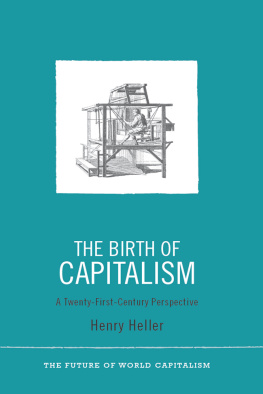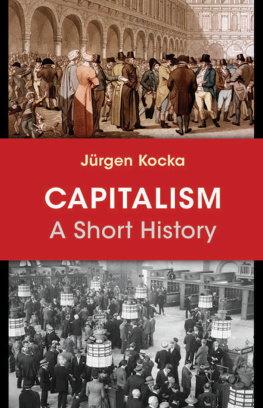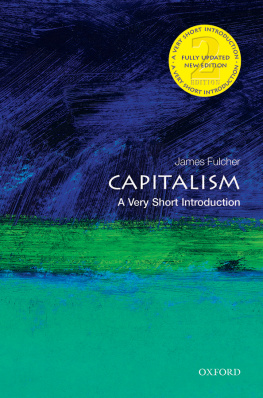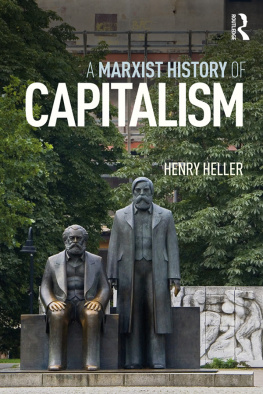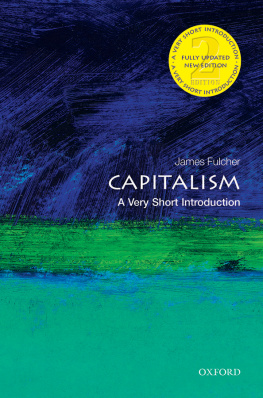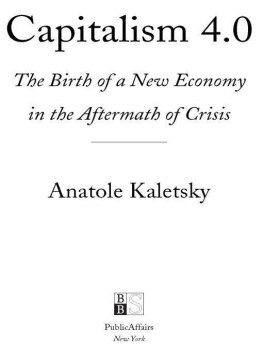THE BIRTH OF CAPITALISM
The Future of World Capitalism
Series editors: Radhika Desai and Alan Freeman
The world is undergoing a major realignment. The 2008 financial crash and ensuing recession, Chinas unremitting economic advance, and the uprisings in the Middle East, are laying to rest all dreams of an American Century. This key moment in history makes weighty intellectual demands on all who wish to understand and shape the future.
Theoretical debate has been derailed, and critical thinking stifled, by apologetic and superficial ideas with almost no explanatory value, globalization being only the best known. Academic political economy has failed to anticipate the key events now shaping the world, and offers few useful insights on how to react to them.
The Future of World Capitalism series will foster intellectual renewal, restoring the radical heritage that gave us the international labour movement, the womens movement, classical Marxism, and the great revolutions of the twentieth century. It will unite them with new thinking inspired by modern struggles for civil rights, social justice, sustainability, and peace, giving theoretical expression to the voices of change of the twenty-first century.
Drawing on an international set of authors, and a world-wide readership, combining rigour with accessibility and relevance, this series will set a reference standard for critical publishing.
Also available:
Remaking Scarcity:
From Capitalist Inefficiency to Economic Democracy
Costas Panayotakis
The Birth of Capitalism
A Twenty-First-Century Perspective
Henry Heller

First published 2011 by Pluto Press
345 Archway Road, London N6 5AA
www.plutobooks.com
Distributed in the United States of America exclusively by
Palgrave Macmillan, a division of St. Martin's Press LLC,
175 Fifth Avenue, New York, NY 10010
Published in Canada by Fernwood Publishing
32 Oceanvista Lane, Black Point, Nova Scotia, B0J 1B0
and 748 Broadway Avenue, Winnipeg, MB R3G 0X3
www.fernwoodpublishing.ca
Fernwood Publishing Company Limited gratefully acknowledges the financial support of the Government of Canada through the Canada Book Fund, the Canada Council for the Arts, the Nova Scotia Department of Tourism and Culture and the Province of Manitoba, through the Book Publishing Tax Credit, for our publishing program.
Library and Archives Canada Cataloguing in Publication
Heller, Henry, 1938
The birth of capitalism : a twenty-first century perspective / Henry Heller.
(The future of world capitalism)
ISBN 978-1-55266-452-0
1. Capitalism--History. I. Title. II. Series: Future of world capitalism
(Winnipeg, Man.)
HB501.H439 2011 330.12'2 C2011-902371-7
Copyright Henry Heller 2011
The right of Henry Heller to be identified as the author of this work has been asserted by him in accordance with the Copyright, Designs and Patents Act 1988.
British Library Cataloguing in Publication Data
A catalogue record for this book is available from the British Library
ISBN 978 0 7453 2960 4 Hardback
ISBN 978 0 7453 2959 8 Paperback
ISBN 978 1 8496 4613 0 PDF eBook
ISBN 978 1 7837 1461 2 Kindle eBook
ISBN 978 1 7837 1460 5 EPUB eBook
Library of Congress Cataloging in Publication Data applied for
This book is printed on paper suitable for recycling and made from fully managed and sustained forest sources. Logging, pulping and manufacturing processes are expected to conform to the environmental standards of the country of origin.
10 9 8 7 6 5 4 3 2 1
Designed and produced for Pluto Press by Curran Publishing Services, Norwich, UK
Simultaneously printed digitally by CPI Antony Rowe, Chippenham, UK and
Edwards Bros in the United States of America
For Rebecca and David
CONTENTS
PREFACE AND
ACKNOWLEDGEMENTS
The current crisis affects a system which today is approximately 500 years old. The forward motion of the capitalist system is founded on the continued prospect of future profits and economic growth. Yet the way ahead is obstructed by many difficulties: low rates of profit and over-accumulation of capital; under-consumption and insufficient demand; the breakdown of the system of global finance; the prospect of energy shortage and acute symptoms of environmental crisis; and a crisis of world governability. Weighed down by these serious problems, the production of profits and growth in the future within the existing system has been thrown into doubt. The multiplicity and depth of the difficulties burdening contemporary capitalism poses the question of whether the system can stabilize and continue to reproduce itself, whether humanity is on the threshold of a momentous transition to socialism, or whether we face an unending stagnation and even a descent into ruin.
If we want to understand the present, and act effectively within it, knowledge of the past is more necessary than ever. The fall into the credit crunch and deep economic crisis was not only completely unexpected by most politicians but unpredicted by most economists. Events of this nature have not been seen for over 80 years longer than the memory of nearly everyone alive today. Commentator after commentator has noted that the narrow focus of todays economists left most of them intellectually floundering in the face of such momentous developments. A historical perspective is not, therefore something of interest only to academic researchers and antiquarians. To understand what is happening now, we have to understand how we got here. For this reason, this book returns to a discussion that has been going on for some time among historians, but which the general public at this point needs to know more about the birth of capitalism, or as it is generally posed, the transition from feudalism to capitalism.
The aim of this book is to explain the background and terms of this vigorous debate, to reassess and shed more light on it, and bring it to the attention of a more general readership. This book is suitable for a general reader who wishes to understand both where capitalism came from, and the key historical debates about its origins. But it is also designed to ensure that a new generation of students and scholars beset with crisis look upon this controversy with fresh eyes and a new sense of its significance.
The Future of Capitalism series calls for a fresh look at the fundamental issues and phenomena of world history. It seeks a reconsideration of the concepts and theories required to comprehend the present stage of world development. This work contributes to the effort by re-examining the debate on the transition from feudalism to capitalism in a way that throws fresh light on capitalisms contribution to world development, its current crisis and future prospects. As the greatest crisis of capitalism since the Great Depression unfolds, and the power of emerging capitalist states challenges the centuries-old dominance of the West, a fresh and critical examination of this often Eurocentric debate is necessary to understand the current historic conjuncture.
Two things have inspired the writing of this work. In the first place I have been studying early modern history for nearly 50 years. It is a field of scholarship which is interesting from a great variety of perspectives, including the history of art, music and science. Examining and analyzing the transition question offers the opportunity of summing up the scholarship of this period from a particularly important and challenging perspective. Indeed, the concrete understanding of the period that I bring to bear represents an important qualification for this task.

